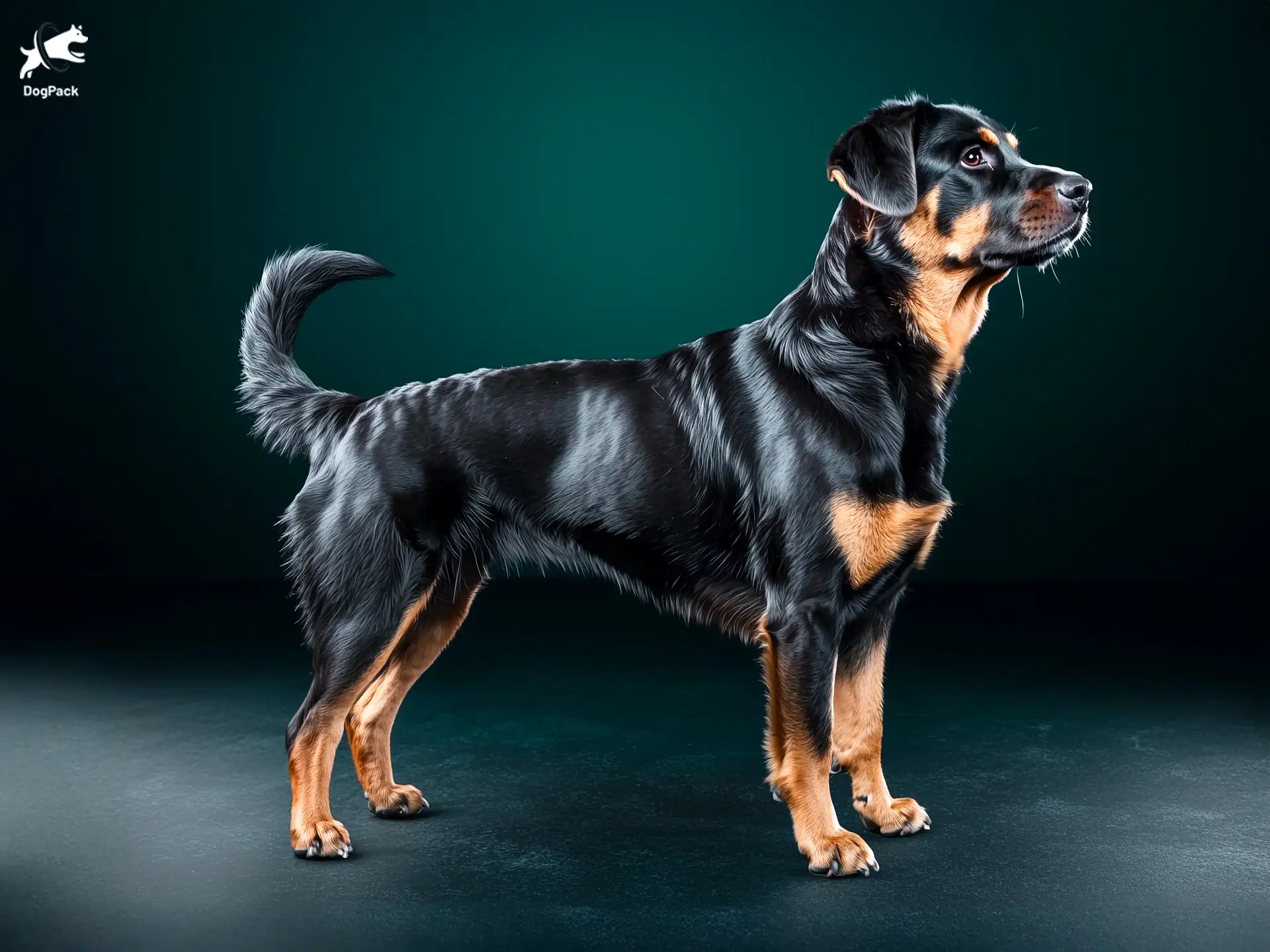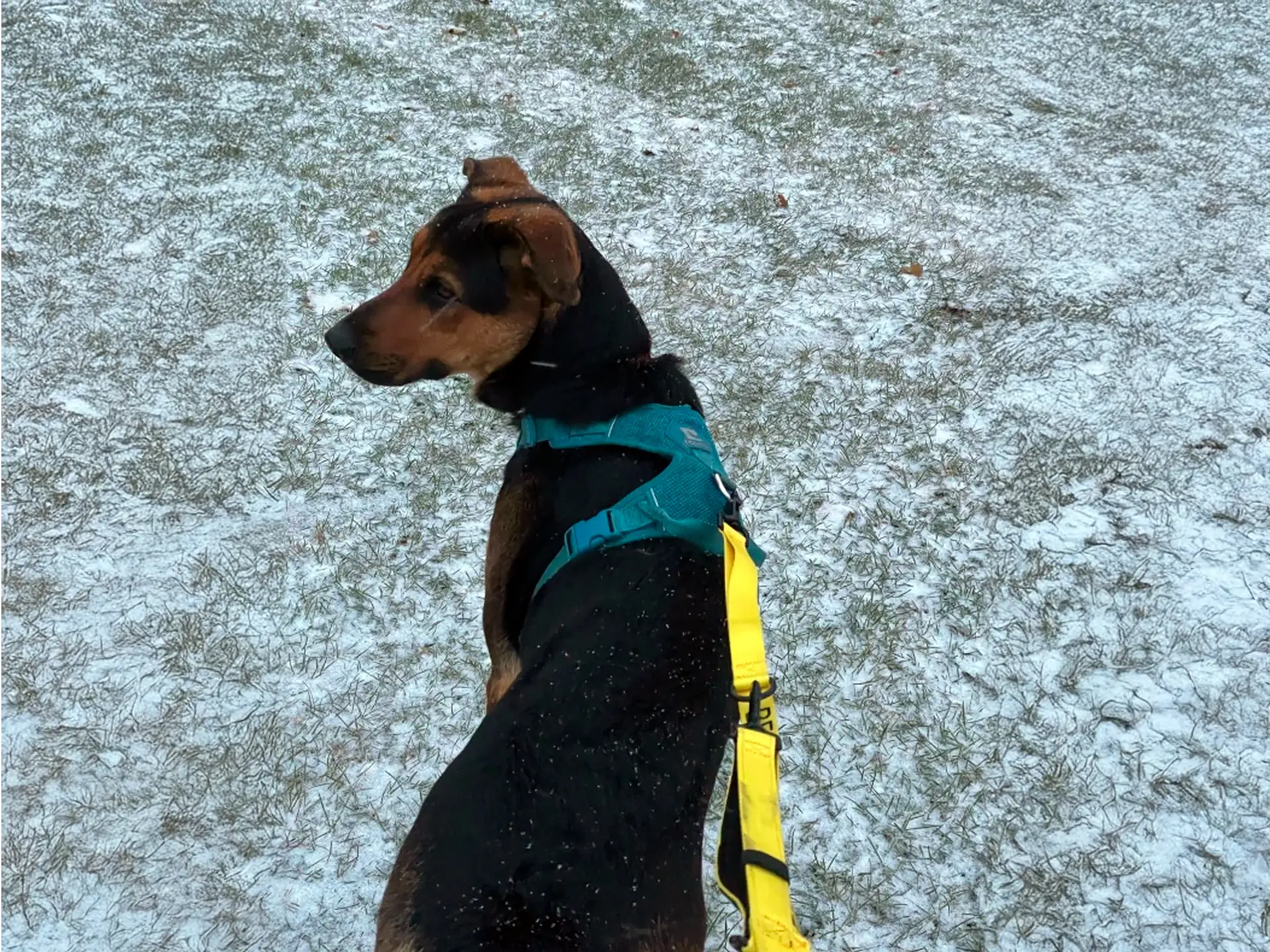Shepweiler Dog Breed Info & Overview
Mix a German Shepherd‘s intelligence and a Rottweiler‘s strength, and you get the Shepweiler—a hybrid breed that’s both loyal and protective. This energetic canine is known for its devotion to family and keen guarding instincts. If you’re looking for a companion that’s as loving as it is vigilant, the Shepweiler might just be your perfect match.
Characteristics
Pictures
Breed History
The Shepweiler is a hybrid breed resulting from crossing a German Shepherd with a Rottweiler. Both parent breeds originate from Germany and have a storied history in herding and guarding roles. The German Shepherd is celebrated for its intelligence and versatility, while the Rottweiler is known for strength and loyalty.
This combination was likely developed to blend the best traits of both breeds. The Shepweiler inherits the German Shepherd’s keen intellect and the Rottweiler’s protective instincts. Though not officially recognized by major kennel clubs, this mix has gained popularity among those seeking a devoted and capable companion.
With roots deeply embedded in working roles, the Shepweiler continues the legacy of service. These dogs have transitioned from herding and guarding livestock to becoming reliable family protectors and loyal companions in modern households.
Temperament, Personality
The Shepweiler is renowned for its unwavering loyalty and strong protective nature. This breed forms deep bonds with its family and is often affectionate and gentle with those it knows. Their alert and watchful demeanor makes them excellent guardians of the home.
Early socialization is crucial for Shepweilers due to their natural wariness of strangers. Introducing them to various people, animals, and environments helps them develop a well-rounded personality. They can coexist peacefully with other pets if raised together from a young age.
Around children, the Shepweiler is typically patient and caring, but supervision is advised due to their size and energy. Their intelligence and eagerness to please make them responsive to training, provided it’s consistent and positive.
Physical Characteristics
Shepweilers are large, robust dogs with a muscular build reflecting their working heritage. They often exhibit the German Shepherd’s erect ears and the Rottweiler’s strong jawline and broad chest. Their confident stance and powerful physique are hard to overlook.
The coat is usually dense and medium-length, offering protection in various climates. Colors can range from black and tan to black and rust, sometimes showcasing a blend of markings from both parent breeds. Their expressive eyes are typically dark brown.
The tail may vary—some Shepweilers have the German Shepherd’s bushy tail, while others inherit the Rottweiler’s shorter tail. Overall, their appearance is a harmonious blend of strength and agility.
Health Issues
Shepweilers are generally healthy but can inherit certain health issues from their parent breeds. Common concerns include hip and elbow dysplasia, which can affect mobility. Regular veterinary check-ups are essential to monitor and manage these conditions early.
They may also be prone to degenerative myelopathy, a spinal cord disease affecting German Shepherds. Bloat, or gastric torsion, is another risk due to their deep chests. Feeding smaller, frequent meals can help reduce this risk.
To ensure a healthy Shepweiler, consider genetic testing of the parents and maintain a balanced diet and regular exercise regimen. Vaccinations and parasite prevention should be kept up to date.
Grooming Needs
The Shepweiler’s coat requires moderate grooming to keep it in top condition. Brushing once or twice a week helps manage shedding and keeps the coat healthy. During seasonal shedding periods, more frequent brushing may be necessary.
Bathing should be done as needed, typically every few months, unless they get particularly dirty. Overbathing can strip natural oils from their skin. Pay attention to their ears, keeping them clean and dry to prevent infections.
Regular nail trimming and dental care are also important. Brushing their teeth several times a week can prevent dental diseases. Grooming sessions are a great opportunity to check for any skin issues or parasites.
Exercise Requirements
With high energy levels, Shepweilers need ample daily exercise to stay happy and healthy. They thrive on activities that challenge both their minds and bodies, such as obedience training, agility courses, and long walks or runs.
At least 1–2 hours of exercise per day is recommended. Without sufficient activity, they may become bored and develop destructive behaviors. Interactive toys and puzzle feeders can also help keep them mentally stimulated.
This breed enjoys having a job to do, so involving them in household tasks or dog sports can be beneficial. Adequate exercise contributes to their overall well-being and strengthens the bond with their owner.
Training Tips
Training a Shepweiler requires consistency, patience, and positive reinforcement. Their intelligence makes them quick learners, but they may exhibit stubbornness if they sense uncertainty. Establishing yourself as a confident leader is key.
Early obedience training and socialization are vital to curb any undesirable behaviors. Use reward-based methods to encourage cooperation. Harsh training techniques can damage their trust and lead to resistance.
Incorporate variety in training sessions to keep them engaged. They excel in advanced obedience and can be trained for specialized roles like search and rescue or therapy work. Ongoing training reinforces good behavior and mental sharpness.
Nutrition, Diet
Feeding a Shepweiler requires attention to their large size and energy levels. A high-quality dog food formulated for large breeds is essential. They typically consume between 3 to 4 cups of dry food per day, divided into two meals to reduce the risk of bloat.
Protein-rich diets support their muscle development, while controlled fat intake helps maintain a healthy weight. Consult with a veterinarian to tailor their diet to their specific age, weight, and activity level.
Avoid overfeeding and monitor treats to prevent obesity. Fresh water should always be available. Be cautious with foods that may cause allergies or sensitivities common in large breeds.
Adoption, Breeders
When considering a Shepweiler, it’s important to find reputable breeders who prioritize health and temperament. Ask for health clearances of both parent dogs to ensure genetic issues are minimized. Visiting the breeder can provide insight into the puppy’s early environment.
Adoption is another worthy option. Rescue organizations and shelters may have Shepweilers in need of homes. Websites like Adopt-a-Pet can help you find available dogs in your area.
Whether adopting or purchasing, ensure the source is responsible and ethical. A well-bred Shepweiler will be a healthier and happier companion in the long run.
Family Pet?
Shepweilers can make excellent family pets for active households familiar with large breeds. Their loyalty and protective instincts make them devoted to family members. They often form strong bonds with children, provided interactions are supervised.
Early socialization helps them become more adaptable and tolerant. They may not be the best fit for homes with very small children due to their size and energy. Introducing them to other pets early on can lead to harmonious relationships.
Their need for exercise and mental stimulation means they thrive in environments where they aren’t left alone for extended periods. Families willing to invest time and attention will find a loving and steadfast companion in the Shepweiler.
Right For You?
If you’re seeking a loyal, intelligent, and protective companion, the Shepweiler could be the right match. They are best suited for experienced dog owners who can provide firm, consistent training and ample exercise.
This breed requires space to roam, so a home with a securely fenced yard is ideal. They may not adapt well to apartment living or sedentary lifestyles. Consider your ability to meet their physical and mental needs before bringing a Shepweiler into your life.
Ultimately, the Shepweiler offers unwavering devotion and can be a rewarding addition to the right family. Assess your lifestyle and readiness to commit to their care to ensure a fulfilling relationship.
Conclusion
The Shepweiler combines the best traits of the German Shepherd and Rottweiler, resulting in a loyal and protective companion. This breed thrives with experienced owners who can meet their exercise and training needs. If you’re ready for a devoted guardian who will be both a friend and protector, the Shepweiler may be the perfect addition to your family.
FAQs
-
What are some unique traits of the Shepweiler compared to its parent breeds?
Shepweilers often combine the German Shepherd’s intelligence and trainability with the Rottweiler’s strength and loyalty. This blend makes them versatile working dogs, excelling in protection, agility, and companionship roles.
-
How well do Shepweilers handle being left alone?
Shepweilers can develop separation anxiety if left alone for long periods. They thrive in environments where they receive consistent companionship and mental stimulation. Interactive toys or a dog sitter can help during absences.
-
Do Shepweilers have specific dietary needs?
Given their large size and active nature, Shepweilers benefit from high-quality, protein-rich diets designed for large breeds. Supplements like glucosamine may support joint health, particularly as they age.
-
Can Shepweilers be trained for specific jobs?
Yes, Shepweilers are highly versatile and excel in roles such as search and rescue, police work, and therapy. Their intelligence and eagerness to please make them quick learners in specialized training programs.
-
Are Shepweilers suitable for novice dog owners?
Due to their size, strength, and protective nature, Shepweilers are better suited for experienced dog owners who can provide consistent training, leadership, and structure to ensure a well-balanced temperament.
Breed Ratings
The Shepweiler is highly intelligent, making training enjoyable and effective when using positive methods.
They are playful and enjoy interactive games, especially those that challenge them mentally and physically.
With abundant energy, they require daily exercise to stay content and prevent boredom.
Shedding is moderate to high; regular brushing helps manage loose hair around the home.
They have a moderate prey drive; early socialization can help mitigate chasing smaller animals.
Grooming needs are moderate; routine brushing and occasional baths keep them looking their best.
Their eagerness to please makes them responsive to training with consistent, positive techniques.
Shepweilers prefer company and may develop separation anxiety if left alone for long periods.
They may bark to alert but are not excessive barkers when properly trained.
Drooling is minimal but can vary depending on which parent breed they take after more.
They can be friendly with other dogs if socialized early; may show dominance without proper training.
Generally healthy with proper care; watch for breed-specific health issues through regular vet visits.














